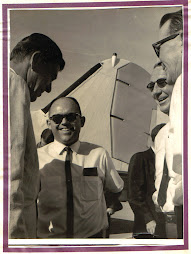
My memories of Al JaCoby stretch back to my second job -- first as wire editor and then demoted to reporter -- at the Escondido Times-Advocate in the 1950s. I arrived there shortly after JaCoby had landed a job on the San Diego Union.
He left behind a legacy among the staff there, which frequently called upon his name and sharp decision process. The county editor, Eloise Perkins, would start one of these JaCoby moments by recalling a quote starting "as my old Armenian grandmother would say..."
The city editor, Ron Kenney, based his well-run desk on things learned from JaCoby.
After leaving the Times-Advocate for greener (financially) fields I did not hear about JaCoby for seven years when I was hired at the Union.
After leaving the Times-Advocate for greener (financially) fields I did not hear about JaCoby for seven years when I was hired at the Union.
I first met him when I was roving feature writer for the county desk, a kinda low-budget and less talented countyside equivalent of Joe Stone.
JaCoby, the Sunday editor, asked me if I could do a feature on a lost gold mine a couple of locals had found near Borrego. Turned out it wasn't Peg Leg's mine, but one from the Depression. Still It made a great yarn, despite the leg wounds inflicted by the chollas.
It also provided me with the experience of staying in one of those luxury cabins, complete with a kitchen and its own little liquor cabinet (no tiny bottles or charges on your bill). The place had no TV or radio since satellite and cable weren't available. To make up for it, after dinner, they would show first-run (or nearly first-run movies) in the dining room. How great.
When I got back, I suggested a feature on how cool it was in Borrego to be out of the reach of TV and radio distraction. My boss, Baker Conrad, liked the idea but thought it might not work, what with the publisher's financial ties down there...
A few months later, JaCoby asked me to do another Sunday piece. This one as to be my favorite story from my Union days. It involved one of the last survivors of Olivenhain, who had been a kid when she and her family moved to the bare land with other German-speaking people in 1885, lured there by full-page ads in eastern papers promising a sunny paradise.
As it turned out, the survivor, an elderly woman recalled nothing much about that first year, except for the rain.
I spent a lot of time talking to people who lived there and researching the colony. It made a wonderful story.
Both the stories I did for Al drew more response from readers than any of the other hundreds of features I did while there.
When I left the Union for the glitter of Alaska, I lost touch with Al for quite some time. Later in my career, I got to know him better when we met at various editors' conventions. He was a wonderful, witty person and I am proud to have known him.

.jpg)
No comments:
Post a Comment